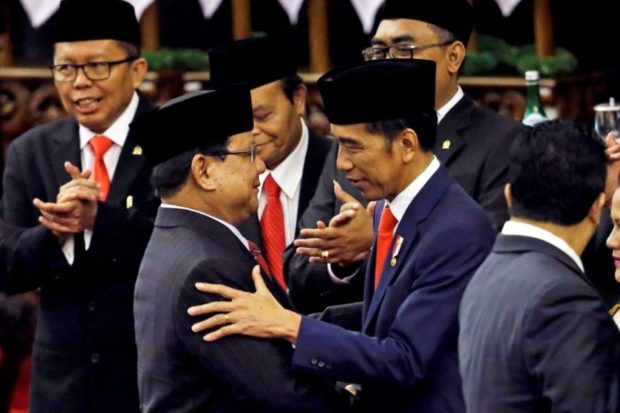
Indonesian President Joko Widodo is congratulated by the Gerindra Party Chairman Prabowo Subianto after his presidential inauguration for the second term on Oct 20, 2019. REUTERS via The Straits Times/Asia News Network
SINGAPORE — Pollsters in Indonesia have been unerring since direct presidential elections were introduced in 2004.
But this unblemished track record – largely due to survey methods and consistent voter behavior – will be sorely tested at the upcoming regional elections because of the Covid-19 pandemic.
The polling companies’ most recent success was at the 2019 presidential election when they gave incumbent President Joko Widodo a lead of 10-20 percentage points over his erstwhile rival Prabowo Subianto. Mr Joko eventually won re-election with 55 percent of the vote against Mr Prabowo’s 44 percent.
Pollsters have also correctly predicted the winners in previous regional elections, particularly in the key provinces of South Sumatra, West Java, Central Java, West Java and Sulawesi.
This is no mean feat considering Indonesia has more than 192 million registered voters spread across 17,000 islands.
High non-response rate
So how is it that Indonesian pollsters have gotten it right when their peers elsewhere, even in advanced democracies like the US and Britain, have stumbled?
Industry experts attribute the polling misses in the US, for instance, to under-representation of certain types of voters.
“The polls didn’t capture enough Republicans and supporters of President Donald Trump, or they had too many Democrats or (President-elect) Joe Biden supporters,” said Mr Scott Keeter, senior survey adviser of the Washington-based Pew Research Center. “Some Trump supporters did not tell pollsters they supported him.”
Similarly, the pollsters got Brexit wrong in Britain in 2016, predicting that Britons would vote to stay in the European Union. Opinion polls also indicated a much tighter race in the 2015 general election, with the polls biased toward the opposition Labour party because those conducting the surveys spoke to too few supporters of the Conservative party.
This is a problem exacerbated by a historically high non-response rate. Pew said the telephone response rate to public polls – one of the most common survey methods – had dropped to six per cent this year from 36 percent in the 1990s.
This is perhaps where pollsters in Indonesia stand out. They had a relatively high response rate of 85-90 per cent in 2019 – not least because they collect data through face-to-face interviews. It’s an old-fashioned method that produces the best data quality, but is too costly for their counterparts in the US and the UK .
“We find telephone interviews not representative of the demographics because most of the interviewees belong to the middle class,” said Dr Dodi Ambardi, former executive director of Lembaga Survei Indonesia (LSI). “But when we interview people face-to-face, the respondents tend to be very cooperative and they are honest. The quality of answers is just better when you meet them in person.”
Contentious races
Still, Indonesia’s pollsters have a harder time predicting contentious races, like the April 2017 Jakarta gubernatorial election.
In that contest, the widely popular incumbent Basuki “Ahok” Tjahaya Purnama seemed a shoo-in, only to see his chances upended by huge rallies organised by hardline Islamists over a casual remark that he made about Islam.
“When an election is highly competitive and voters are highly polarized, respondents tend to be reluctant to honestly convey their political choices,” said Mr Arya Fernandes, a researcher from the Jakarta-based Centre for Strategic International Studies.
The CSIS survey one month before the Jakarta election had a non-response rate of 17.7 per cent compared to 10 per cent a year ago. The institute has mitigated the problem by allowing respondents to answer anonymously, he said.
“We ask for the respondent to choose the candidate in a sample ballot paper and put it in a closed-envelope. The enumerators don’t get to see the respondents’ choice or answers so it makes the respondents feel free to pick the answer,” said Mr Arya.
Pollsters in Indonesia can also be thrown off by loyal voters from smaller parties.
In the 2018 gubernatorial race in West Java, some pollsters failed to predict the late surge for trailing candidate, Sudrajat, after the Islamist party, PKS, endorsed him.
“PKS has a relatively small group of supporters but these supporters are more loyal than any other party and they can be mobilized effectively from all across the country. Many polls managed to predict the winner but some didn’t because they couldn’t capture all the PKS supporters in their sample,” said Dr Dodi.
The great unknown
For the regional elections on Wednesday (Dec 9), pollsters will have to overcome an even bigger hurdle: the Covid-19 pandemic.
“The pollsters will still conduct their surveys the same way even during the pandemic,” said Dr Dodi.
“There are contradictory observations about whether the pandemic will dissuade people from going out to vote. I think the turnout in urban areas will be lower than in the rural areas and that will affect parties supported by the middle class. But we don’t know how that will affect the polls.”